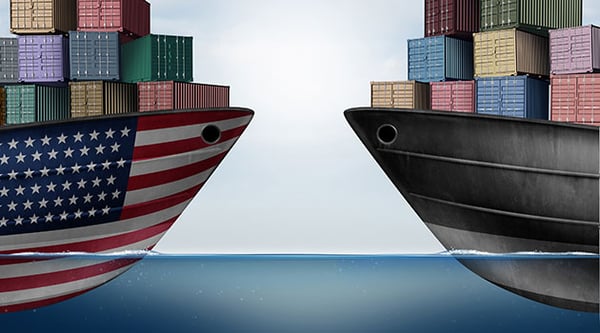 The Trump administration on Friday escalated a trade war between the world’s two largest economies, moving ahead with tariffs on $50 billion of Chinese goods and provoking an immediate response from Beijing. Today Trump suggested possibly moving forward with additional tariffs which may exceed $200 million. The shipping community has been on edge about the impact the tariffs may have on the logistics market since the tariffs were proposed some 18 months ago. Before we examine the potential fallout lets outline precisely what industries will be affected.
The Trump administration on Friday escalated a trade war between the world’s two largest economies, moving ahead with tariffs on $50 billion of Chinese goods and provoking an immediate response from Beijing. Today Trump suggested possibly moving forward with additional tariffs which may exceed $200 million. The shipping community has been on edge about the impact the tariffs may have on the logistics market since the tariffs were proposed some 18 months ago. Before we examine the potential fallout lets outline precisely what industries will be affected.
In January 2018, Trump imposed tariffs on solar panels and washing machines, and later this year, he imposed tariffs on steel and aluminum. Beginning on June 1, 2018, the Trump administration imposed a 25% tariff on imports of steel, and a 10% tariff on aluminum, on the European Union, Canada, and Mexico. The tariffs angered U.S. allies, who planned retaliatory tariffs on U.S. goods and heightened chances of a trade war. China said that it would retaliate for the tariffs imposed on $50 billion of Chinese goods that come into effect on July 6. India is also planning to hit back to recoup trade penalties of $241 million on $1.2 billion worth of Indian steel and aluminum. Other countries, such as Australia, are concerned with the consequences of a trade war.
Industries Most Affected
For American companies which manufacture metals, the tariffs are good news. But businesses that consume steel and aluminum, like automakers and beverage producers, the tariffs will likely mean higher prices. Domestic automakers will experience significant increases in raw materials in auto production and aftermarket parts. Beverage and food manufacturers will also see price increases in aluminum and metal can material. Just about any other manufacturer that incorporates metal in the production of their products like Caterpillar, Boeing, and Lockheed Martin will be facing higher raw material costs. For a full list of the products and tariffs, click here. As we all know by now, these costs will translate to higher retail prices for cars, beverages and airline tickets.
Managing the Coming Challenges
Importers will have time to adjust to any changes as they will not go into effect immediately. These and other trade policy shifts are disruptive to global supply chains, and the businesses and consumers depend on them. Regulatory modifications require companies to be keyed into new or altered trade sanctions, export license requirements, customs documentation, tax and duty codes, and stacks of legal requirements.
Companies engaged in global trade must manage a tremendous amount of information to establish and maintain compliance with regulations. This information, also referred to as trade content, ranges from the harmonized tariff schedules for product classification, to the duty rates needed to calculate landed cost, to the controls that determine what is required for a transaction to be legally completed. To efficiently import or export goods, shippers need fast access to data for all the countries where they trade.
Unfortunately, collecting, cleansing, and publishing trade content is a complicated task; which becomes even more challenging when considering the number of countries, number of government agencies, differences in trade regimes, and the ever-changing trade position of each country in the supply chain.
Many companies lack the personnel and expertise to monitor trade compliance and manage international supply chains. Perhaps now, more than ever is the time to consult a qualified Logistics provider like Land Link Traffic Solutions. Our experts can ensure an uninterrupted supply chain during the trade tariff storm ahead. Contact us today to discuss your needs @ www.Land-Link.com.



 Land-Link, a well respected professional organization, has been providing its clients with effective transportation and logistics solutions since 1978.
Land-Link, a well respected professional organization, has been providing its clients with effective transportation and logistics solutions since 1978.

